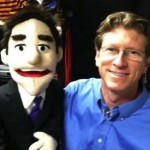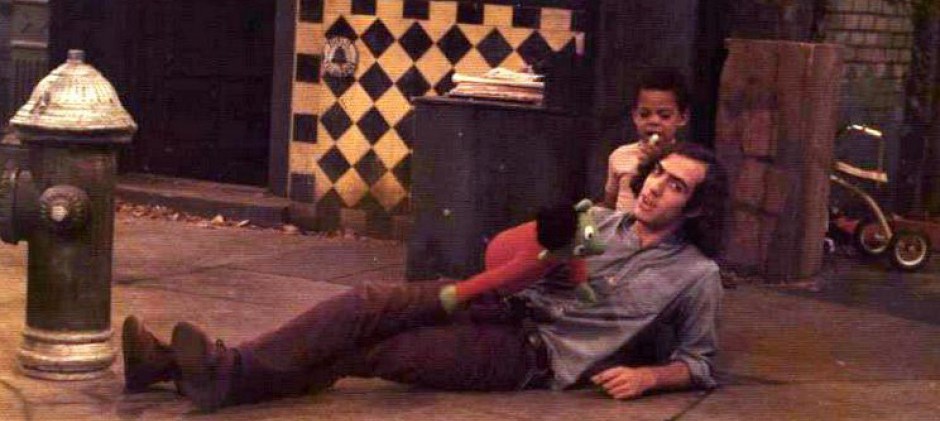 I am sorry to mark the passing of Michael Earl, a longtime puppeteer, whom Richard Hunt mentored as a young performer on Sesame Street. Earl briefly played Snuffleupagus, Forgetful Jones, and dozens of other roles in The Muppet Movie, The Muppets Take Manhattan, and various other Muppet and non-Muppet productions. Earl also passed on the craft of television puppetry, founding Puppet School with his partner Roberto Ferreira. Here’s a brief excerpt from our 2011 interview.
I am sorry to mark the passing of Michael Earl, a longtime puppeteer, whom Richard Hunt mentored as a young performer on Sesame Street. Earl briefly played Snuffleupagus, Forgetful Jones, and dozens of other roles in The Muppet Movie, The Muppets Take Manhattan, and various other Muppet and non-Muppet productions. Earl also passed on the craft of television puppetry, founding Puppet School with his partner Roberto Ferreira. Here’s a brief excerpt from our 2011 interview.
Jessica Max Stein: So you had said, the first time you met Richard Hunt, you didn’t recognize him.
Michael Earl: Yes, we were on the set of The Muppet Movie. He walked over to me and he went, “Hi! I’m Richard Hunt!” I said, “Okay.” He goes, “No, I’m Richard Hunt.” I’m like, “I don’t know what that means.” He goes, “I’m one of the five main Muppeteers!” And I’m like, “Oh, well, congratulations.” He was used to people being very impressed with him. I was just this 19-year-old kid; I didn’t know enough to know who he was.
JMS: What was Richard like in those days?
ME: He was very boisterous and loud. I remember one day he came in on Sesame Street. In the old studio, you couldn’t see the door; you could only hear people, if they were talking loudly. He came in on one day and said something really loud, like, “Shirley, I’m coming to the supermarket!” Just some random statement, so everybody would know that he was there. It was really funny. Everybody laughed. “Richard’s here!”
JMS: Sesame Street sounds pretty interesting in the late ‘70s.
ME: It was really fun. I happened to be there at a time when the Muppet Show was shooting, and all the Muppeteers were in London. So they were only coming to Sesame Street once in a while, so me and Brian Meehl were responsible for doing most of the puppets at that time. But it was stressful, too, for Brian and I to have that responsibility. It was a lot of responsibility for new people. We were new puppeteers.
They wrote a lot of things for us. For me they wrote Forgetful Jones. They invited us to a writers’ meeting, to sit in, when they were just coming up with Forgetful Jones, and they told us their ideas. They wanted to create some characters for us that played to our strengths, so they asked if I could do a Southern accent, and I was like, “Sure, absolutely.”
JMS: And then Richard took over Forgetful when you left. How was his performance different?
ME: The problem that I was having with the character was that they thought it was too slow-paced. They did some testing of it and found out that kids were losing interest in Forgetful Jones, so they wanted him to be more fast. And I couldn’t really figure out how to do that. I didn’t know how to make a forgetful character fast. But when I left, he sped it up.
I also did Snuffy, and some of the Honkers, and a lot of the Anything Muppets: talking tomatoes, talking mayonnaise jars, or talking monsters, or whatever it was.
Richard once said to me that the way he started at the Muppets was doing right hands. I didn’t. I started doing lead characters, from the beginning. He didn’t like that. He was like, “That’s not fair that I had to start doing right hands and you just waltz in here and start doing lead characters.” I said, “I didn’t make the decision, the producers decided that I was going to do that.” So he got his nose out of joint about that, for about a minute.
But he loved his life. He loved being sexual. He loved having these playful affairs. He once said to me, “Everything is sexual.”
It was a very different time. He wasn’t out, as we know “out” today. I think he was ashamed of being gay. He called himself a “funny boy,” which indicated to me that he couldn’t even say the word “gay” or “homosexual”. But I would say everyone knew. They just didn’t talk about it. Jim never talked about it, Frank never talked about it. I was never aware of anybody asking him about anybody he was dating, or anything like that. It was just work-related.
JMS: What does it mean to be a good puppeteer, and how does Richard’s work exemplify that?
ME: What it means to be a good puppeteer, is to be a good actor. He was a good singer, too. They gave him a lot of singing to do, which I thought was a good use of his skill.
But to be a good puppeteer is to be a good actor – which is to listen, and react, and to tell the truth. For him, that embodies who he was. He was a good listener. He knew how to tell the truth, mostly. He was a very vocal person. He was very in the moment. So I think what made him a good puppeteer was all that – just who he was.
